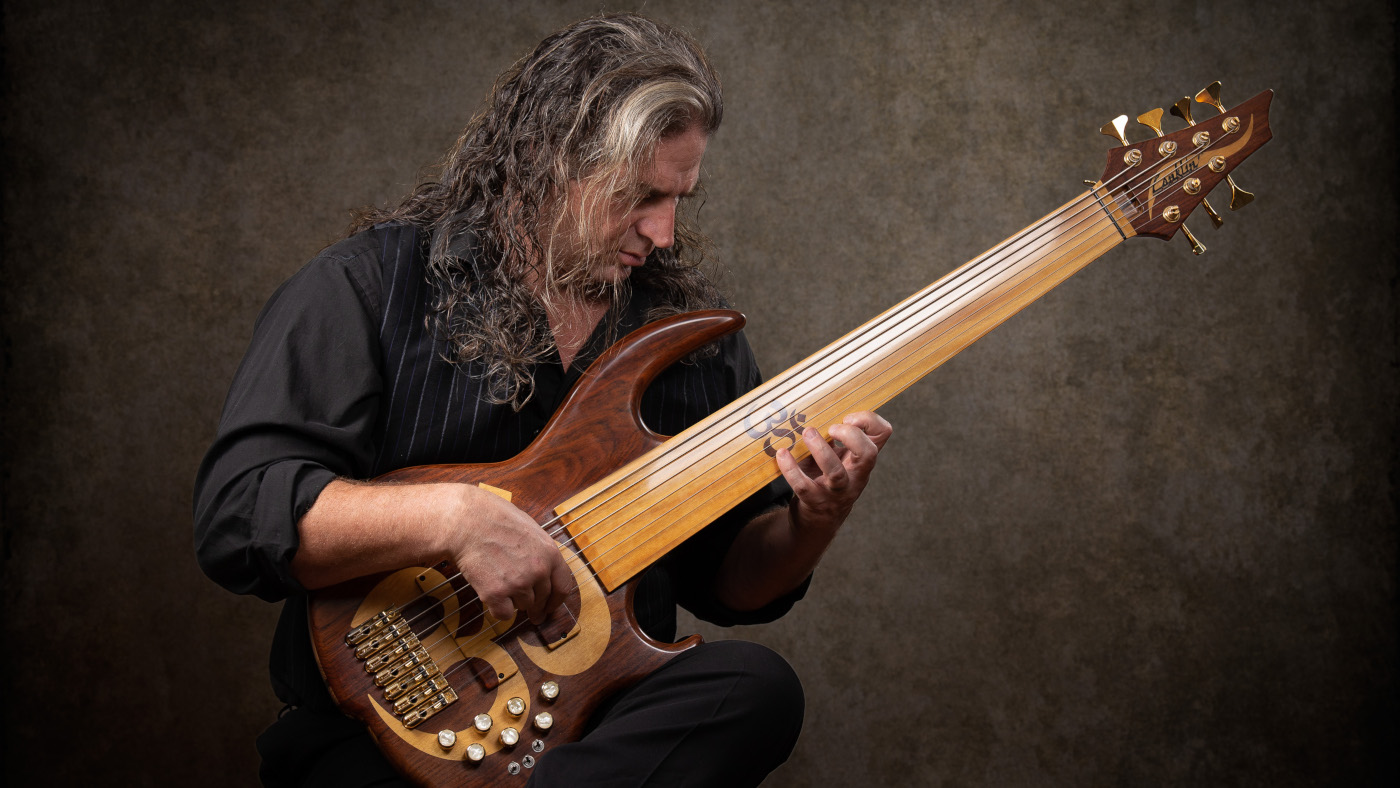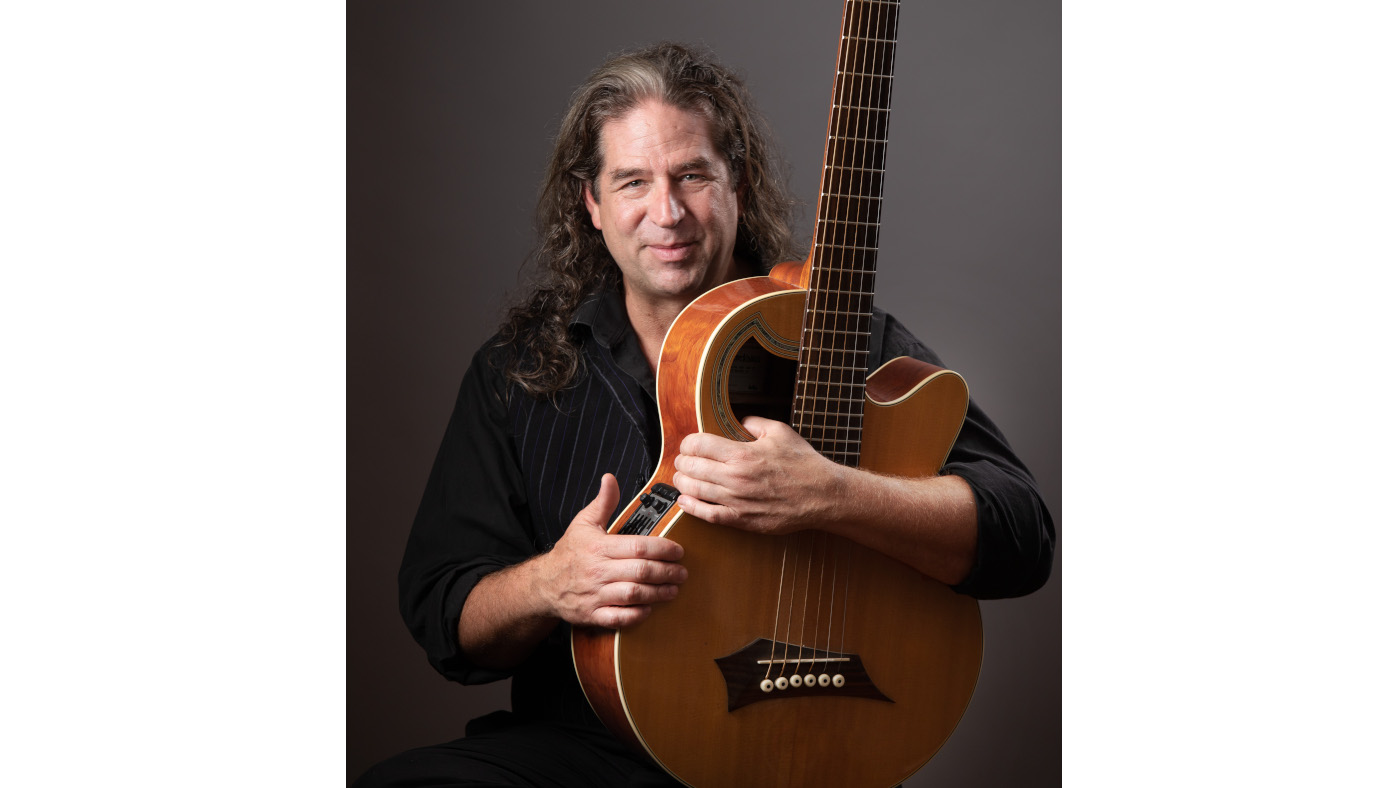Jason Everett: “I thought what the heck, I might as well have the high F string, too!”
Into the extended range with the seven-string fretless bass player

Want all the hottest music and gear news, reviews, deals, features and more, direct to your inbox? Sign up here.
You are now subscribed
Your newsletter sign-up was successful
The imposing sight of Jason Everett’s seven-string fretless bass guitar belies the transcendental, collective nature of his music on his new album and video package, Playing With Fire.
Joined by Trey Gunn on his lap-held Warr Guitar, seven-string violinist Radhika Iyer, V Selvaganesh on kanjira and custom drum kit, Anil Prassad on tabla, violinist Rachel Nesvig, violist Aleida Gehrels, and cellist Paul Hirschi, Everett delivers memorable melodies rendered with Eastern vocal vibrato, and engaging ensemble improvisation - all over a spectrum of ever-shifting world grooves and natural- sounding odd meters.
Born in Colorado and raised outside of Phoenix, Everett began playing woodwinds at the age of eight before seeing Donald ‘Duck’ Dunn in the Blues Brothers movie and becoming captivated by the bass.
He started on a Hohner electric bass and soon fell under the sway of Rush and Geddy Lee, graduating to a Rickenbacker 4001. Joining his high school jazz band, he got turned onto Jaco Pastorius, and the lure of fusion and experimental jazz.
I consider myself a fusion artist in that I blend all of my influences - prog rock, jazz, classical, world and Indian music - into my compositions
At 18, he moved to Minneapolis and claimed the bass chair in the free jazz group Little Green Men, whose members turned him onto his most pervasive influence: John McLaughlin’s famed 1974 quintet, Shakti. “Shakti connected me with my truer, deeper, spiritual self as a musician and composer,” he notes.
Realising the creative and financial challenges of raising a family as a working musician, Everett moved to Seattle, took a day job, and put music on the back burner. With his kids grown, he put himself back on the map in 2014 via a YouTube version of Jog, an Indian raga in which he doubled and emulated the phrasing of vocalist Ujwai Nagar using his extended-range fretless bass.
He made further inroads with Moksha: The Elimination Of All Duality, featuring Selvaganesh and guitarist Fareed Haque. He regards Playing With Fire as his most proud musical statement to date.
Want all the hottest music and gear news, reviews, deals, features and more, direct to your inbox? Sign up here.
How did you write for the record and what was your inspiration?
“I consider myself a fusion artist in that I blend all of my influences - prog rock, jazz, classical, world and Indian music - into my compositions. I write mostly on bass; lately I’ve been using my Boss RC-300 Loop Station. That’s how I wrote Mysterious World.
“One of the compositional methods that has evolved for me is being able to create different basslines, feels and chord changes for the same melody - you can hear that on Return and Resolve. The Loop Station allows me to write a melody and a bassline, and then take out that first bass-line and try other grooves and chord progressions to express different emotions, while still supporting the melody.”

Seventh heaven
Let’s talk about your fretless seven-string OM bass and the techniques you’ve developed on it.
“I had bought an inexpensive six-string on eBay, and I dug the high C string and the ability to play a wide range in one position. So I went back online and found a used Conklin fretless GT-7.
“I thought what the heck, I might as well have the high F string, too! Bill Conklin saw my video for Jog with that bass and he and Mike Apperson contacted me, and we co-designed my seven-string OM bass in 2016. It’s a neck-through with a seven-piece zebrawood and wenge neck, walnut wings, and a cocobolo and yellowheart top.”
How about the electronics?
I pluck close to the bridge for a punchy, growly sound, varying tones between the Bartolini and piezo pickups
“It has a three-band EQ, two custom Bartolini pickups, Graph Tech piezo pickups in the bridge saddles, Hipshot Xtenders on the A and D strings, and a MIDI system which I never use. I don’t have any special technique except that I mostly play across the neck by position, as opposed to up and down the fingerboard, and I use both hands to dampen the open strings. Generally, I pluck close to the bridge for a punchy, growly sound, varying tones between the Bartolini and piezo pickups.”
Your other key voice is your fretted six-string Warwick Alien acoustic.
“That’s featured on Awakenings. It was given to me by Bay Area jazz bassist Edo Castro. I use it for my sitar technique of playing a melody on the top string and using the remaining strings as resonant drone strings. As with the sitar, playing the melody on one string requires moving large distances up and down the fingerboard very quickly. I tune it high C, low C, high C, and then G, C, F below that.”
Do you find that having a video version of the album enhances the music?
“It’s a concept I borrowed from Snarky Puppy: record the music live, have a multi-camera shoot, and create a compelling video with compelling music. Puppy is a band that plays mostly instrumentals, yet has a huge, young audience; that’s a model which more artists need to embrace.”
Equipment
- Basses: Custom Conklin OM seven-string fretless; six-string Warwick Alien acoustic bass guitar
- Strings: Kalium Hybrid Wound [.018-.028-.030-.055-.073-.098-.130]
- Effects: Boss RC-300 Loop Station
- Amp: Markbass Big Bang head, Traveler 102P cab

